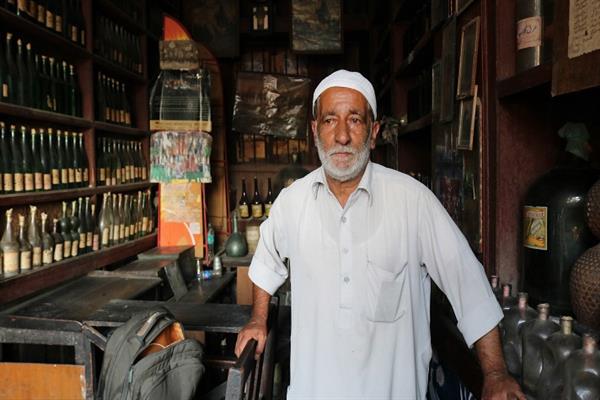Nestled within the narrow lanes of Fateh Kadal, area of old city Srinagar, an enduring tradition has quietly persisted for centuries. It has a legacy that transcends time, a symbol of vintage Kashmiri richness and elegance. At the heart of this living heritage is a grizzled man named Abdul Aziz Kozgar, the custodian of an ancient craft, distilling the aromatic wonder known as Arq e Gulab, or rose water, with a method refined over generations. Aziz Kozgar proudly carries forward the legacy of his family, whose journey traces back to Turkey and Central Asia.
“ My shop boasts nearly four centuries of existence”, he said with a sense of accomplishment. We have been serving generations of society, and the name Kozgar itself, derived from Persian, means the user of jars.” he said. Step into Aziz Kozgar’s shop and you will encounter an antique ambiance. Here, the use of emerald green glass bottles is non-negotiable. “To the best of my recollection these bottles were either imported from France or Britain”, he said.
Aziz Kozgar advocates use of glass over plastic, firmly believing in providing his customers with the purest quality. He is deeply reverent of his ancestors from Hamdan, attributing his mastery to their blessings and guidance. While his pristine Kashmiri Arq e Gulab holds a special place in his offerings, he has also explored the art of blending fragrances. Some of his notable creations include Arq e Badyaan, Arq e Kewra, Arq e Dalchini (Cardamom), and Arq e Sandal (Sandalwood). These fragrant symphonies add depth and allure to his already mesmerizing line of products.
“I find immense satisfaction in my work”, Aziz Kozgar confides with a sense of fulfillment, Adding, “Seeing my Gulab e Arq being used in divine rituals at holy shrines brings me great joy.” Aziz Kozgar’s journey is intrinsically tied to the spiritual legacy of Kashmir. He hopes that the art of Arq e Gulab will persist, serving as a timeless reminder of the enduring traditions that make Kashmir truly exceptional.
Writer is intern with Rising Kashmir








